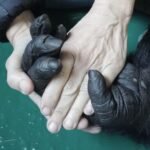On the 16th of March we celebrate International Macaque Day. Many Macaque species are endangered and this is what makes this Day so important. The day is designed to raise awareness of the decline in populations due to deforestation and the pet trade. It is agreed that unless urgent action is taken now, some macaque species will be lost from the wild in as little as 10-15 years!
Even in areas where there are large macaque populations, the effect of humans has an undesirable influence on the lives of these animals, as seen in these videos after the appearance of the coronavirus and the disappearance of tourists. It has been the loss of habitat that has pushed them to become dependent on humans and they now face a survival challenge due to the lack of natural resources.
At Fundacio Mona we care for four rescued Barbary Macaques; all four were victims of the pet trade. They were taken from their parents at very young ages, smuggled out of their native Africa and kept as pets. It is estimated that 300 Barbary Macaques are being taken from the wild to be sold as pets every year and with a population believed to be as small as 11,000 to 15,000 individuals spread over a very fragmented area of North Africa, time is running out for these amazing primates.
WHY ARE MACAQUES SO SPECIAL?
Macaque Fact 1: Aside from humans, Macaques are the most widespread primate genus
Macaque Fact 2: There are 23 species of Macaque, including the Crab-Eating Macaque and the Rhesus Macaque.
Macaque Fact 3: Barbary Macaques are the only non human primate species to live wild in Europe.
Macaque Fact 4: Macaques use cheek pouches to store food.
Macaque Fact 5: Macaques communicate via vocalisations and facial expressions. For example, Pig-Tailed Macaques pucker their lips and push out their chin to greet a familiar individual. Whereas, Barbary Macaques chatter their teeth together as a greeting.
Macaque Fact 6: Many Macaque species help to maintain healthy forests by dispersing seeds an enabling new trees and plants to grow.
Macaque Fact 7: Insects are an important part of Macaque diets; this means they play an important role in controlling invertebrate populations.
WHAT CAN YOU DO TO HELP?
- Help secure a lifelong future for all the primates at Mona by donating just 1€ per month…
- If you go on holiday and see a macaque (or any other primate) being used for entertainment or as a photo prop, don’t take part or have your photo taken and report what you have seen using this form
- Help raise awareness of Fundacion Mona’s work by telling your family, friends and colleagues about us. Also, visit and share our Facebook, Twitter and Instagram posts


